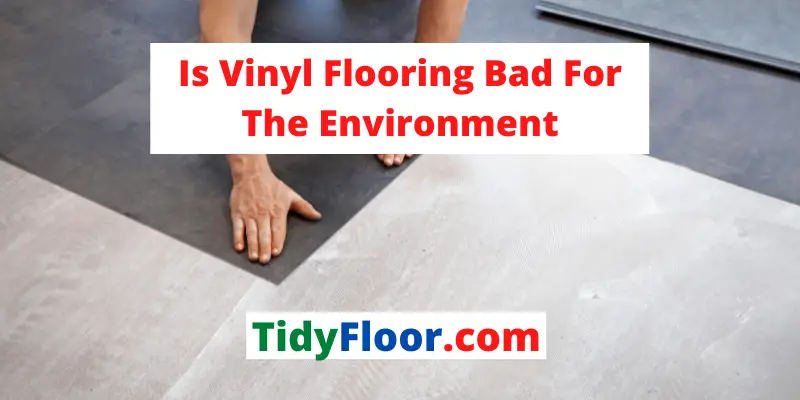You may have already heard that vinyl flooring is bad for the environment and health. But I’m not sure why vinyl flooring is bad for the environment. There may be a lingering doubt in your mind as well. However, this article will explain the real effect of vinyl flooring on the environment.
Vinyl flooring is obviously bad for the environment. They discharge different types of harmful gases during their production, installation, usage, and disposition. These gases are partially responsible for global warming and the depletion of the ozone layer.
I am an environmental activist and in this article, I will talk about a life-threatening danger that may already have been installed in your home and ticking like a time bomb. This article will tell you how to make you and your family safe from vinyl flooring.
7 Reasons Why Vinyl Flooring Is Bad For The Environment:
Research shows, vinyl flooring spreads toxicity to our environment in all the phases of its life cycle. Production, installation, use, and disposal – in every stage, they pose a threat to our ecology.
1. Bad Impacts Of Vinyl Flooring On Environment While Production:
Vinyl floor planks are manufactured from petroleum-based chemicals. The ingredients include polyvinyl chloride (PVC) and plastic. While production of vinyl planks at factories, toxic chemicals like dioxins are emitted into the air. This dioxin is poisonous and a proven cause of cancer.
Besides dioxin and polyvinyl chloride, vinyl manufacturers also emit ethylene dichloride gas, making the surrounding environment extremely toxic.
2. Bad Impacts Of Vinyl Flooring On Environment While Installation:
The easy installation process of vinyl plank and loose lay flooring is alluring for general people to do it themselves. Many are unaware of the fact that new vinyl planks continuously discharge multiple harmful chemicals in the air including phthalates. Phthalates are responsible for birth defects and many other dangerous diseases.
3. Bad Impacts Of Vinyl Flooring On The Environment When Used:
Throughout its whole lifetime, a vinyl floor plank continues to discharge harmful chemicals into the air. Whenever they are cleaned or get hit by something, there is an emission of toxic gases.
Toxic gas is emitted whenever vinyl planks get direct sunlight. Besides, most of the vinyl planks are glued with asbestos. This asbestos is also a carcinogen.
4. Effects Of Vinyl Flooring On The Environment When Disposed Of:
When vinyl planks are destroyed, they harm the surrounding environment as they did during their manufacture. A wave of toxic dioxin gas is released all around.
5. Bad Impacts Of Vinyl Flooring On The O-zone Layer:
Polyvinyl Chloride, the main gas emitted by vinyl floors, is one of those notorious gases, which are directly responsible for the hole in the ozone layer of the earth. As you know, through this hole in the ozone layer, harmful ultraviolet rays enter the world.
6. Impacts of Vinyl Floor On Global Warming:
Research shows PVC gas is one of the many reasons for overall global warming. So, we can say, vinyl floors are indirectly responsible for the biggest threat to the earth – global warming.
7. Vinyl Floors Are Non-Biodegradable:
Like all other plastic, the synthetic vinyl floors are not biodegradable. So, they are hard to recycle and thus, a threat to our environment.
5 Chemicals Of Vinyl Floors That Are Not Good For The Environment:
Like carpet or wooden floors, vinyl flooring is not environment-friendly at all. So far researchers have been able to find out the following harmful gases to be discharged by vinyl floors:
1. Polyvinyl Chloride (PVC):
The main ingredient of vinyl flooring, PVC, is so harmful that it has been banned in the United States and Europe to be used in child toys. This is a well-known cause of cancer.
2. Formaldehyde:
Formaldehyde is another chemical that vinyl floors mix with our environment. This is also a carcinogen. This chemical is from the group of harmful gases, known as Volatile Organic Compounds (VOC).
3. Phthalates:
Phthalates are used in vinyl planks to make them pliable enough to be used as a floor. Recent studies show phthalates are one kind of endocrine disruptor. That means, they disrupt human bodies’ natural development, hamper reproductive health, disturb the metabolism and hinder the hormonal secretion of the nervous system.
4. Organotins:
Organotins are a kind of stabilizers, which are needed by vinyl planks to ensure integrity. Experts say exposure to organotin can cause skin and eye irritation, birth defects, respiratory problems, and cancer.
5. Urethane:
Urethane is used to make a vinyl plank scratch-free. This is also a toxic chemical. It can be off-gassed even years after the installation.
5 Eco-friendly Flooring That Are Alternatives Of Vinyl Flooring:
Instead of vinyl flooring, I would suggest the following alternative flooring systems. They are safer than vinyl floors, so far the environment and health are concerned.
1. Cork Floor Tiles:
Made from cork oak trees, cork floor tiles are fire-resistant and at the same time eco-friendly. They are also less expensive. Cork floors are generally soft for footing and require little maintenance. If your house is free from heavy traffic and weighty furniture, cork floors should be your best choice.
2. Bamboo Floor Tiles:
Bamboos are completely biodegradable, hard, and friendly to the environment and human bodies. Walking on bamboo in your house will surely give you the feel to live within nature. Since they are cheaper, it does not matter if they are not too durable.
3. Reclaimed Hardwood Floor Tiles:
The reclaimed hardwood floor tiles are processed from old but pure wood. So using them will keep your conscience free of the guilt of cutting wood. At the same time, you will feel nature right inside your home. This type of floor is both sturdy and easily maintained.
4. Limestone Floor Tiles:
Limestone floor tiles are made from calcium carbonate. They are cheap and can be cut into any required shape. The only problem is, they are porous and hence easily stained.
5. Linoleum Floor Tiles:
Linoleum flooring is a complete natural solution for your home. It is created with linseed oil, tree resin, cork powder, wood flour, and tree resin. That is why by no means they will emit any harmful chemicals. They can do great in your home, only if you can keep them away from direct sunlight.
Commonly Asked Questions On Vinyl Flooring:
Is There Any Safe Way To Use Vinyl Flooring?
All kinds of vinyl floors are a source of toxic and carcinogenic chemicals. They increase the risk of global warming too. There is no safe way to be prescribed to use vinyl flooring. For the good of the earth and all of us, you should abandon all kinds of vinyl flooring at our earliest.
Why Is Vinyl Flooring Not Banned Yet?
For the last 30 years, there has been a worldwide campaign against the usage of vinyl flooring. And the campaign is gaining momentum gradually. Already a lot of the largest companies of the world, like HP, Apple, Volkswagen, Honda, etc. along with 170 nations have adopted policies to phase out the use of vinyl.
Does Vinyl Chloride Exposure Require a Test?
Summation of several tests can tell if you were exposed to vinyl chloride or not, depending on how long ago you were exposed to vinyl chloride and by what amount. These tests are not generally available at a physician’s office.
How Long Will Vinyl Floors Be Off-Gas After Installation?
The harmful off-gas process of vinyl floors can continue for years, depending on the environment of your house. Generally, the emission is extreme in the first five weeks.
Final Words:
A recent report says the global market for vinyl flooring is growing 13 percent each year. Which is alarming in the context of health and the environment. The future of the world and the lives of our next generations depend on us. We have to be vocal against vinyl flooring for a better tomorrow.
You may also want to read:
Vinyl Flooring vs Carpet Flooring: An In-depth Discussion
Which Floor Is Suitable For Your Climate, Vinyl Or Wooden Floor?



11 thoughts on “Is Vinyl Flooring Bad For The Environment?”